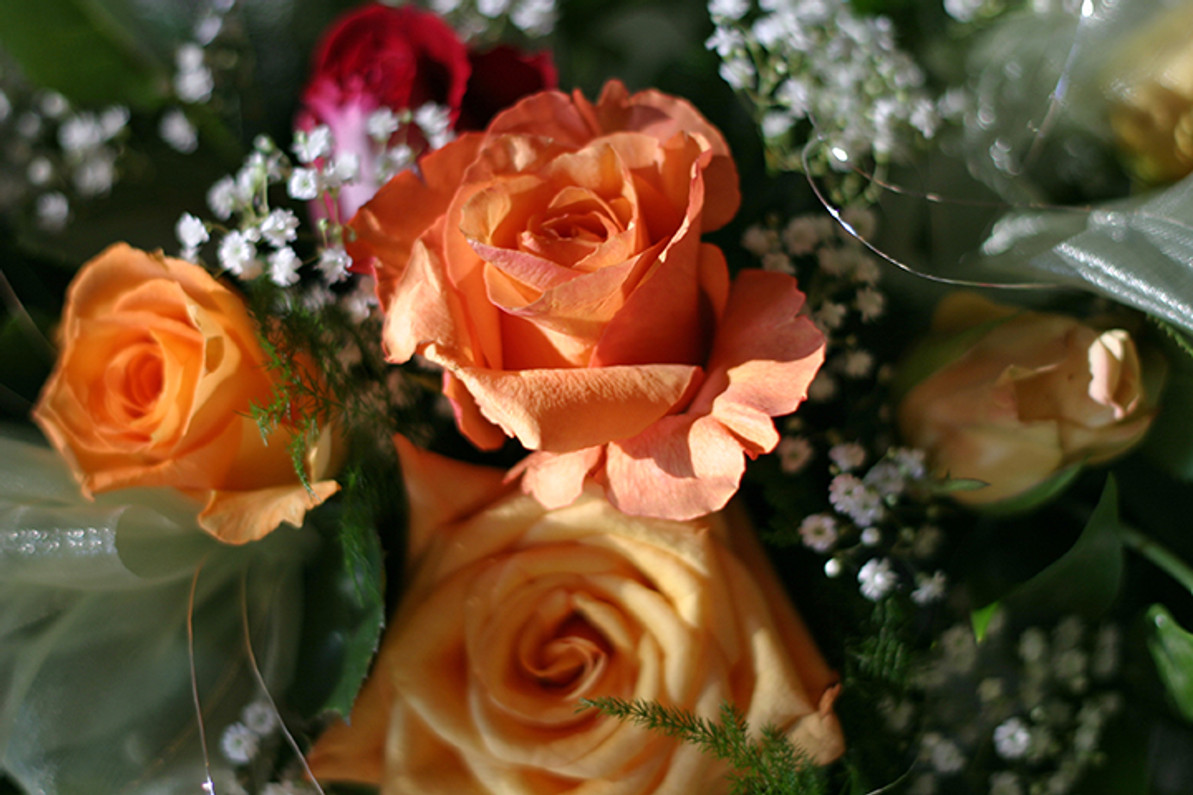Flowers Will Fall
On Love, Grief, and What Remains
By Heather Hattie-Mae Mahaney
“Even stillness has weight. When it breaks, petals remember their edge.”
When the quiet breaks, flowers will fall.
The silence held like breath in a chapel—
but even stillness has weight.
When it breaks,
petals remember their edge.
The vase tips.
Memory spills.
And I—
I gather what's left
from the floor of that moment.
It began with a bouquet.
Back when I worked at the engineering firm, my boss—a high-octane adrenaline junkie with a
surprisingly tender eye for blooms—started a tradition of honoring the administrative staff with
custom flower arrangements during Admin Week. He didn’t just send a generic bunch. He chose
each one carefully—color-coordinated and adorned with little charms or flourishes. It became a
bit of an office legend—his annual tribute.
Joe, my husband, found the whole thing amusing—and slightly competitive.
“There is no try, only do,” he liked to say. So, challenge accepted.
Every year on our anniversary, he upped the ante. He sent show-stopping floral masterpieces to
my office—ones that turned heads and stopped conversations. Tropical cascades of birds of
paradise, proteas, anthuriums—the bold and the breathtaking. The reception desk, where I sat,
became a gallery space for his love letters in bloom.
He worked closely with the florists, becoming friends with them, insisting on originality and
heart in every design. He added scarves, curled vines, fancy ribbons—whatever made the
arrangement sing. And each one did.
For fourteen years, he never missed a beat. The flowers were vibrant. The gesture, unmistakable:
You are seen. You are loved.
Eventually, I started buying flowers for myself. Small cut bouquets at the grocery store.
Arranged simply on our kitchen table. It became a ritual we shared. A quiet celebration of life’s
beauty, tucked between workdays and winter storms.
Even after he died, I kept doing it.
Because flowers in bloom remind us—there is still color. Still hope. Still chapters left to write.
There are seasons in grief when silence settles like snow.
A mug of coffee grows cold in your hands. The hallway echoes a little too much. And
memory—memory drifts in through the blinds like soft dust, mingling with the warmth of what
was.
Time becomes a strange companion. It unfurls in uneven petals, revealing truths you couldn’t
hold all at once. There is no straight line. Just the slow recognition that you are still standing.
Still breathing. Still holding the vase.
I found resilience in the rituals: watering the houseplants he used to forget. Brushing dust from
the bookshelf. Running my palm across the glass vase on the table—the one we bought together.
Even slipping into my shoes became a kind of prayer—flowering with remembrance.
Because grief is not just absence. It is the echo of presence.
A prism, bending every color of memory and regret.
Some days, I could laugh. Could walk past the places we once haunted without breaking. Other
days, the quiet would snap like a branch in winter—a plate clattering in the sink, a bloom
slipping from the vase—and suddenly, the ache flooded back.
Grief doesn’t end.
It transforms.
It teaches you to live with both the love and the loss.
I thought I was learning how.
And then, the quiet broke in a new way. Not with the soft ache of memory—but with sharpness.
With the cold, unwelcome realization that not everyone who stood near me came with good
intentions.
There are flowers that heal, and others that harm.
And I, still fragile, hadn’t known the difference.
Some people, like oleander or foxglove, appear beautiful. They stand in the vase beside you,
smiling softly—but their roots are toxic. Camouflage, not comfort. They were never there to help
you bloom—only to feed off the light you gathered.
And in their presence, I began to wither. Not all at once—but in small, silent ways.
The discoveries came slowly—layers of truth I hadn’t asked to find. And with them, a new grief:
not for the dead, but for the living who had failed me. For the care that was counterfeit. The
family that chose calculation over grace.
Still, I kept the flowers on the table.
Still, I reached for beauty.
Even amidst thorns.
Because healing, like love, is something we learn to arrange from the pieces.
We gather what remains.
We let go of what poisons.
We open, again, to the sun.
And when the quiet breaks,
I no longer fear the sound.
I listen for what blooms next.
Author Bio
Heather Hattie-Mae Mahaney is a memoirist and poet based in Anchorage, Alaska. Her
writing explores themes of love, loss, resilience, and the healing power of nature. Born and
raised in rural northern Maine, she draws inspiration from a life shaped by hard work, deep
family roots, and the wild rivers she came to love after moving north. Heather’s work captures
the quiet strength of everyday people, the grief that reshapes us, and the fierce tenderness found
in both animals and wild places.




